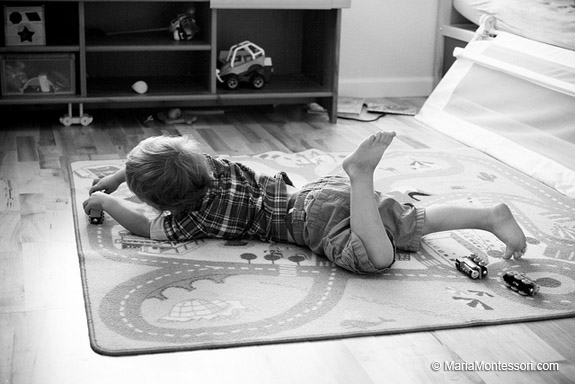
October 25, 2022
There are a lot of talks these days about attention and concentration.
Learning disorders like ADHD seem to be ever on the rise, while many now question the effectiveness (particularly long-term) of the usual ADHD treatments. Is this “crisis of attention” due to genetics or to our increasingly hurried and distracted culture? And if the environment is part of the problem, what can we as parents do to help our children focus better?
Concentration is a skill that can be improved with practice, and Montessori provides the perfect environment for that effort. Montessori children have many opportunities to practice deep concentration every day as they work with the materials. Thanks to the three-hour work period, children are able to focus on a task for as long as they wish without external interruptions. As their ability to concentrate improves, the children also develop better self-control and self-regulation, all skills that are essential to success in further schooling and life in general.
But what about at home, or in the years before a child begins preschool?
There is a strong push today for parents to spend lots of “quality time” with their children. Many of us feel like we need to be actively interacting with our children every minute we are with them (or fearing boredom we give them a video or iPad games to keep them occupied). Of course, playing with our children and interacting with them is an important part of bonding and their development. But just as important is the opportunity for self-directed independent play, even at very young ages. The best way to develop focus and concentration is to practice it, and the best way to let them practice is to not interrupt children (even infants) when they are beginning to pay attention to something.
When you see your infant or toddler looking or playing intently with a toy (or photograph/kitchen utensil/bug/stick/whatever it may be that’s holding his attention), resist the urge to join in. Don’t say or do anything. It can feel almost like neglect for some of us, especially if we’re used to always playing with/entertaining our children, but really this is an amazing opportunity to bond as you observe your child and get to know them better. Watch as they focus on that item (it really is amazing to see that look of intense focus on their face!). If they need you they will let you know, but until then give them that time and space to concentrate and explore.
At first, any particular thing may only hold their attention for a few minutes at a time. Children vary in their natural “starting point” ability to focus. I remember my first son, at just a few months old, would sometimes spend up to 10-20 minutes at a time simply watching his hanging toys without needing my attention, while my second had a much harder time entertaining himself through most of his first year. But if you give them time and space without interruptions, you’ll notice these periods gradually lengthening. My zero-attention-span second baby is now a fully-mobile 14-month-old who is much more interested in the world and is often content with me simply being nearby as he plays independently with the pots and pans in the kitchen. My four-year-old often plays in his room all by himself in the morning after waking up, not needing another person or gadget to entertain him for as long as an hour or more before coming out to greet us. He sometimes even gets mad at me if I try to join him before he’s done. This sort of independent, focused play is wonderful for their development and creativity, and the more they can practice it the better and easier it will become.
As an aside, I’d like to say a word here about TV/”screen” time and its effects on concentration, based on our own experiences. We do not ban TV in our homes, but I have definitely noticed a need for balance.
Moderate amounts of screen time (no more than 1-2 hours a day, a few days a week) seem to work well for us without noticeable ill effects. However, if we go above that—perhaps getting up to daily watching—I notice a difference. Suddenly my 4-year-old will have a much harder time playing independently, instead asking to watch TV more and more frequently as if he has a hard time thinking of other things he wants to do. When he does play it’ll be imitations of whatever show he’s been watching rather than his own creation. So I also feel that a component of fostering concentration is to limit screen time, especially at these younger ages. I can’t say what that “attention threshold” may be as I’m sure it’s different for each child—some may be able to have more screen time and others may feel the effects with less. Try to figure out what that threshold may be for your children, and stay below it. I know all too well how crucial that “TV break” can be as a parent, but if you can help your children develop their concentration so they can play independently for extended periods of time, that is a much more rewarding “break” for everyone involved.